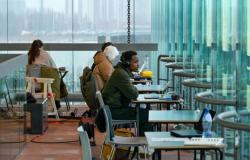The Halle-Vilvoorde public prosecutor’s office was created as a Flemish trophy during the division of the judicial district of Brussels-Halle-Vilvoorde. Ten years later, the carefully sought linguistic balances create new frustrations. ‘Even bilingual defendants sometimes request a language change.’
The Halle-Vilvoorde public prosecutor’s office celebrated its tenth anniversary on Sunday. The Dutch-speaking public prosecutor’s office prosecutes crimes in the Brussels periphery and has become a permanent fixture within the justice system. Yet the seat still has temporary allure. Pending a new building, the public prosecutor’s office has its office in a former retirement home in Asse. For a public prosecutor’s office that was once a political issue, the outdated location does not exude much grandeur.
The Halle-Vilvoorde public prosecutor’s office was established on March 31, 2014, as an outgrowth of one of the largest political crises our country has ever known. This goes back to 2010, when the Leterme II government fell. The then chairman of Open VLD, Alexander De Croo, pulled the plug because negotiations on the split of Brussels-Halle-Vilvoorde were not making progress. After elections and a long formation, the Di Rupo government emerged, which reached an agreement on that issue.
It happens that statements by a French-speaking suspect have to be translated from French into Dutch and then back into French.
The BHV constituency has been a pebble in the shoe, especially on the Flemish side, ever since the language boundaries were established in 1963. After the redrawing of the electoral districts in 2002, an unconstitutionality arose because the Brussels-Halle-Vilvoorde district was the only one located partly in monolingual Flanders and partly in bilingual Brussels. This had to be resolved in order to be able to organize valid elections.
“The division of the judicial district was much more complex than the administrative division,” Servais Verherstraeten (CD&V) reflects. He was State Secretary for State Reform in the Di Rupo government and had to put the agreement into practice. ‘The administrative division was a political matter, the judicial division was a human matter, over which there were also clashes on the ground.’
The essence
The Halle-Vilvoorde public prosecutor’s office exists ten years this month. After the judicial division of the Brussels-Halle-Vilvoorde district, the municipalities in the Flemish periphery around Brussels received their own Dutch-speaking public prosecutor’s office.
The Halle-Vilvoorde public prosecutor’s office has drawn up its own criminal policy that is better suited to crime in the more residential cities and municipalities around Brussels. But the language law that was drawn up when BHV was split is today a thorn in the side.
French-speaking defendants have the right to request a language change in Halle-Vilvoorde. Many do this to buy time and hope for a milder verdict. For the Ministry of Justice, this means extra translation work and a higher chance of recidivism pending the trial.
Large law firms were not so keen on the split, he remembers. Just like the Dutch-speaking lawyers’ bar in Brussels, which feared that the Flemish position in the Brussels justice system would weaken. The magistracy was concerned about the workload. And then there were heated discussions about the practical organization, such as where all those new chambers would be located in the Brussels Palace of Justice and where the offices of the public prosecutor’s office would be located.
Smuggling
Zaventem Airport is a special point of interest in the district. It is a place where all kinds of crime come together. ‘It involves all kinds of smuggling: from cash money to drugs and endangered animal species. In addition, we see the same phenomenon as in the ports: the risk that airport employees are called in by criminal organizations to turn a blind eye when a shipment of drugs arrives. These are of course things that we absolutely want to avoid and that we are strongly committed to.’
More repressive prosecution policy
The general feeling among lawyers is that the Halle-Vilvoorde public prosecutor’s office takes stricter action than the Brussels justice department, which often has less time to prosecute smaller crimes. “The prosecution policy in Halle-Vilvoorde is more repressive,” says Brussels criminal lawyer Yannick De Vlaemynck. ‘That actually applies to all Dutch-speaking public prosecutors’ offices, if you compare them with the French-speaking ones. For this reason, many defendants request a language change to French.’
The Brussels press judge Denis Goeman handles the French-language files of Halle-Vilvoorde two mornings a week in the 57th chamber of the court of first instance. About fifty cases come along every month. They often concern facts that were committed at the airport. ‘The Halle-Vilvoorde public prosecutor’s office does its job well and brings complete files to court. These are varied matters, ranging from the import of monkey meat to international drug trafficking to fraud with PCR tests during the corona crisis.’
Of course we would prefer that French speakers were tried in Dutch under the guidance of an interpreter, as is done in Flanders and vice versa in Wallonia. But we are bound by the language law.
Carol Vercarre
Public Prosecutor of the Halle-Vilvoorde public prosecutor’s office
The language law stipulates that French speakers may request a translation of the file so that they can appear in court in their own language. “That sometimes leads to absurd situations,” says De Vlaemynck.
Take the example of a French-speaking Brussels resident who is arrested in Dilbeek and subsequently arrested by a Dutch-speaking investigating judge. On paper, this file is initially conducted in Dutch, with the suspect being provided with an interpreter who translates everything into French. Afterwards, the suspect can request a language change, after which the justice department must convert the entire file into French. The bottom line is that statements made by the suspect must be translated from French into Dutch and then back into French. ‘Belgian surrealism’, according to De Vlaemynck.
That situation has existed for ten years and is the result of sensitive negotiations, but today it seems absurd. On the Dutch-speaking side, both Vercarre and her predecessor Van Wymersch already exposed that problem. ‘We notice that defendants sometimes ask to change languages, even if they are bilingual. This is undoubtedly done to save time. And perhaps also with the aim of exceeding the reasonable period and therefore receiving a lower sentence before the case comes to trial. That is not ideal,” says Vercarre.
Technical battles
The split of BHV has left even more absurdisms in existence. The remnants of sensitive community discussions still have an impact. The later declared unconstitutional rule that the Brussels public prosecutor must always belong to the French language role recently led to a blocking of the appointment of several top magistrates.
“The technical battles over language legislation were a revelation to me,” says Verherstraeten. ‘At the time I assumed that lawyers in Brussels were used to a bilingual climate, but it still remained extremely sensitive.’
That is no different today. ‘The Flemish people wanted to split BHV at the time. And the French speakers, with their backs against the wall, have obtained in compensation that French speakers could be tried in their own language and that the Brussels public prosecutor would be French-speaking. Of course, these arrangements were bric-a-brac and we find them absurd and foolish. But then they should not have signed the deal at the time,” says a French-speaking magistrate.
We need pragmatic solutions. Wouldn’t a Dutch-speaking and a French-speaking public prosecutor’s office in Brussels be a good idea?
Pascale Monteiro Barreto
Chairwoman ASM
“We have the impression that the balances in the agreement that resulted in the law of July 19, 2012 are gradually being questioned,” said Brussels judge Pascale Monteiro Barreto, who is president of the French-speaking magistrates’ union ASM. ‘We see this at the Halle-Vilvoorde public prosecutor’s office, but also in the appointment of the public prosecutor in Brussels, which has still not been arranged despite the political statements about this.’
Language legislation inevitably continues to lead to politically difficult and protracted discussions. “We need pragmatic solutions,” says Monteiro Barreto, who suggests extending the linguistic division logic further. ‘A Dutch-speaking and a French-speaking public prosecutor’s office in Brussels, wouldn’t that be a good idea? The previous division of the courts, such as the labor court and the company court, still functions.’
Since the split, the pebble has been removed, but community sensitivities continue to play a role in the Justice Department. Despite these imperfections, Verherstraeten generally evaluates the split of Brussels-Halle-Vilvoorde positively. “The most important thing about the agreement on BHV is that it has brought community peace, which lasts a relatively long time,” he says. ‘We have not had a state reform for almost ten years and there are no longer community tensions that create major political blockages.’
Tags: Ten years division BHV language imbalances lead absurd situations
-




